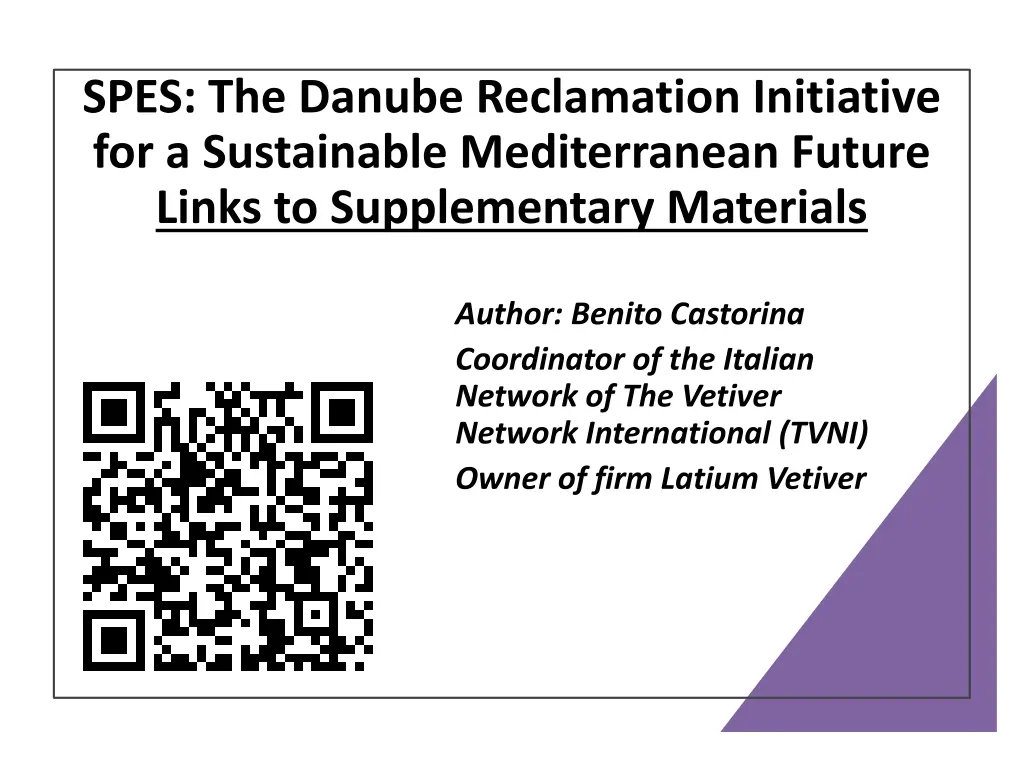
Danube Reclamation Initiative for a Sustainable Mediterranean Future
Benito Castorina, an architect and founder of Latium Vetiver, is recognized for his innovative work in environmental engineering and sustainable practices. He is the Italian Coordinator for The Vetiver Network International and focuses on Integrated Environmental Architecture using Vetiver grass technology. Castorina's projects, such as the phytoremediation of contaminated land in Rome, showcase the efficiency of Vetiver in ecological solutions. Learn more about his contributions to sustainable practices and renewable energy initiatives.
Download Presentation

Please find below an Image/Link to download the presentation.
The content on the website is provided AS IS for your information and personal use only. It may not be sold, licensed, or shared on other websites without obtaining consent from the author. If you encounter any issues during the download, it is possible that the publisher has removed the file from their server.
You are allowed to download the files provided on this website for personal or commercial use, subject to the condition that they are used lawfully. All files are the property of their respective owners.
The content on the website is provided AS IS for your information and personal use only. It may not be sold, licensed, or shared on other websites without obtaining consent from the author.
E N D
Presentation Transcript
SPES: The Danube Reclamation Initiative for a Sustainable Mediterranean Future Links to Supplementary Materials Author: Benito Castorina Coordinator of the Italian Network of The Vetiver Network International (TVNI) Owner of firm Latium Vetiver
BRIEF PROFESSIONAL PROFILE Benito Castorina is an architect mainly known for his innovative work in environmental engineering and sustainable practices. He is the founder of Latium Vetiver, an Italian company specializing in the use of Vetiver grass for ecological solutions. Castorina has introduced innovations of the Vetiver System in Italy and abroad, inspired by global experiences with "The Vetiver Network International (TVNI)." In 2023, he became the Italian Coordinator of TVNI. His work focuses on "Integrated EnvironmentalArchitecture," combining Vetiver technology with traditional and modern engineering methods to achieve the best results at the lowest costs. Along with his entrepreneurial activities, he has collaborated extensively with universities and research centers.
BRIEF PROFESSIONAL PROFILE Italian Vetiver Network (https://www.vetiver.org/vetiver- newsletter-november-2023/?utm_source=chatgpt.com) In July of this year [2003] Benito Castorina became the Coordinator of the Italian Vetiver Network. Benito is a longtime proponent of Vetiver Grass Technologies and in 2015 he was awarded a Certificate of Technical Excellence by TVNI for his work in Bio- Engineering, Plant Propagation, and Phytoremediation. He is also engaged in looking at innovative uses of Vetiver biomass for renewable energy, specifically to produce hydrogen gas. A YouTube video on the subject is available. You can find out more about Benito s work through the two papers he presented at the recent ICV-7 in Thailand, and those may be found in the Proceedings from the Conference.
Efficiency of Vetiver for the Phytoremediation of Contaminated Land in the Valle Del Sacco (Rome, Italy) The Project presented in 2021 by Latium Vetiver involves raising the embankments in three distinct phases, each six months apart. With the premise that in the Latium Vetiver nursery, for the consolidation of slopes, a Rapid Rooting System (RRS) is produced, composed of ready-to-use Vetiver hedges and a Vetiver filter barrier simulator (Vetiver Hedge Simulator). This system performs the function of retaining the soil right from the moment it is put into place, and in this specific case, of raising the embankments in the shortest time possible. The Project is based on the results of the studies, projects and interventions carried out over the years by Latium Vetiver in collaboration with firms, universities and research centres, as well as on the information provided by the international Vetiver network. https://www.youtube.com/watch?v=gJq4itSbORk
The use of Vetiver to raise river banks This paper intends to illustrate the proposal formulated by the firm Latium Vetiver of Benito Castorina and accepted by the Lazio Region on February 22, 2021 (Ufente River Contract) to solve the problem of river flooding due to the lowering of its banks. The effectiveness of Vetiver, in this specific case as the only possible solution, will be demonstrated as an example to be replicated. https://www.youtube.com/watch?v=NdyZMBB3oYI
Links Vetiver Biomass for production of Hydrogen One hectare of Vetiver captures 154 tons of CO per year, compared to just 3 tons per hectare per year captured by a forest. Currently, atmospheric CO levels exceed 340 parts per million, while the optimal level to rebalance vital cycles would be around 330 ppm. Cultivating Vetiver and using it to produce hydrogen addresses both environmental and energy challenges at the same time, offering a clean, non-polluting solution. Vetiver in a fluidized bed reactor following the Water Gas Shift Reaction (WGSR) is transformed into a syngas containing 64% hydrogen and 36% CO2(no tar is produced in the process and the gas is N2 free). https://www.youtube.com/watch?v=RS6fxCvjz50
links Vetiver for Phytoremediation The solution involves the use of Vetiver, a non-invasive grass that, through its roots, releases a high amount of oxygen (chlorophyll photosynthesis: 6CO + 6H O = C H O + 6O ), thereby activating biological processes (to multiply the bacterial flora) and chemical processes (to immobilize part of the toxins). Other toxins are absorbed and incorporated both into the roots and the leaves of the Vetiver plant. This solution is also ideal for those aiming to produce truly organic products, as Vetiver helps eliminate heavy metals, atrazine, residues from the use of fertilizers and pesticides, and other contaminants that may be present in the soil, including those of natural origin. 8 B Castorina Paper.pdf (vetiver.org) Presentazione di PowerPoint (vetiver.org) https://www.youtube.com/watch?v=gJq4itSbORk&t=30s
links European Competitivity The aim of the Project is to interest large companies in investing in a project that offers them great commercial opportunities and the European institutions the opportunity to direct investments in this moment of great economic, political and geopolitical instability in which the EU can take on a leading role in a strategic action that would unite the 44 countries, which directly or indirectly suffer increasingly from the effects of pollution of the Danube waters, to solve a significant problem. But also an opportunity to use the VS in the 44 countries affected by the project, which are: the countries that the river crosses, the countries over which its hydrographic basin extends and the countries essentially bathed by the Black Sea and the Mediterranean Sea https://www.youtube.com/watch?v=OY2z9xK__IA
Final Message The Danube Reclamation Project through the SPES System offers a concrete, sustainable, and replicable vision to tackle the great challenges of our time. It is not just a technical project but a manifesto for a new economic and environmental paradigm, placing life, water, biodiversity, and human dignity at the center, in harmony with the planet. Email bcastorina@gmail.com Site: https://www.latiumvetiver.it Cellphone: +39 3384603719 THANK YOU!






















